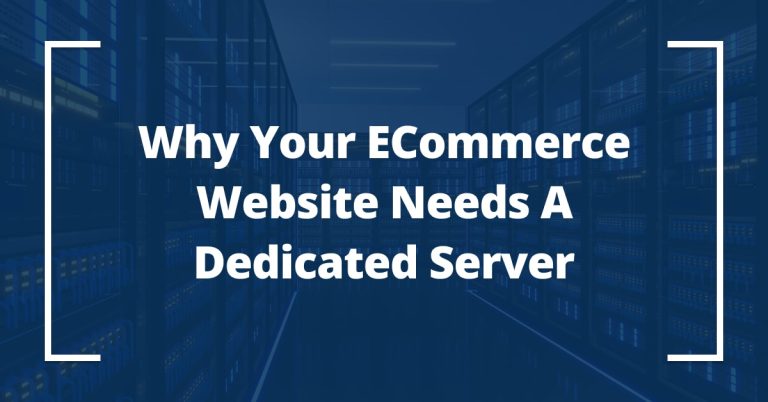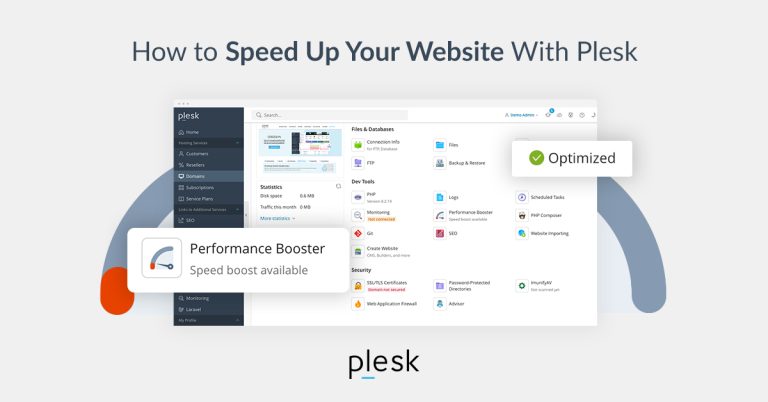When you’re running an enterprise, you need a hosting provider that’s equipped to handle your unique needs.
Complex websites or entire networks of websites require a host that can deal with higher levels of traffic. The hosting provider should offer better security standards, more storage, and improved support.
If you pick a plan that can’t support your venture, you’ll end up with an unstable website that’s often slow or down. As a result, you could lose customers — not to mention the unnecessary time and money spent trying to fix these recurring issues.
Many web hosting plans run on some variation of shared hosting, where multiple websites share the same server resources. There may be some virtual isolation, but you’re still dividing single-server solutions between dozens of people.
That’s generally not the best option for enterprises.
Instead, you should look for a managed dedicated server host that offers high-quality infrastructure and an expert support team to keep things running smoothly.
However, there are many managed dedicated hosting providers out there. So, how do you know which is the best option for your business?
To make an educated choice, you need to understand the difference between managed and unmanaged hosting and how to evaluate dedicated hosting plans.
We’ll explain these key concepts and compare the top managed dedicated server hosts.
Here’s what we’ll cover:
But first, let’s firmly establish why your enterprise business should look for a fully managed dedicated hosting plan.
Fully Managed Dedicated Server Hosting
With fully managed dedicated server hosting, all physical and virtual resources belong to you, and you’re 100% isolated from other servers in the same data center. The hosting company will handle your server’s setup and ongoing maintenance.
This type of hosting is best for enterprises that need a robust server for their resource-heavy websites and prefer to outsource server management.
Managed vs Unmanaged Hosting
Understanding managed and unmanaged hosting will help you make the right choice for your business.
With managed hosting:
- The web host handles setup, maintenance, updates, and security.You’ll still need front-end developers, but the web host will keep the back end up to date and running properly.
- Support is more in-depth and attentive.
- Extra services are usually provided.
- You may not have root access to the server.
- The plans are somewhat more expensive because of the included server management services.
With unmanaged (also called self-managed) hosting:
- The web host provides a server. You must install the operating system and other necessary tools and actively oversee server maintenance.
- Support is hands-off and only there to assist with physical server issues. If something goes wrong, you’re usually on your own to fix it.
- The plans provide few additional services other than developer tools.
- You will always have root access to the server.
- The plans are less expensive.
In short, managed hosting is hassle-free, while unmanaged hosting offers more control at the expense of more work.
Why Managed Dedicated Server Hosting Is Best for Enterprises
Usually, managed hosting is more suitable for all but the largest enterprises.
Since you won’t need to hire a development team to maintain the back end, you’ll free up resources for other business tasks. Plus, you can feel secure knowing everything is handled on the server end, no matter how large or complex your website network is.
So, what kind of server should you get with your managed hosting plan?
As an enterprise, three types of hosting are generally appropriate for your needs:
- Virtual private server (VPS) hosting simulates a dedicated web server by using virtualization to isolate you from other websites on the same network. This can be suitable for enterprises that don’t run complex, resource-heavy websites.
- Cloud servers are also an appropriate choice if your enterprise needs maximum scalability. Cloud hosting is virtually isolated from other servers. You can add and remove resources as needed.
- Dedicated servers are reliable and powerful, making them suitable for enterprise operations. They’re especially ideal for enterprises that expect a large but steady amount of traffic. However, most hosting plans will help you add more resources as you need them.
Large enterprises that need a fully physically isolated environment should go with a dedicated server. It offers the scalability, reliability, and performance required to keep your website network running like a dream.
Why Choosing the Right Host for Your Enterprise Matters
Choosing the right host results in a website that is rarely down, loads quickly, and is secure.
Choosing the wrong host means dealing with constant downtime, slow load speeds, attacks from hackers and bots due to poor security, unresponsive customer support, and very little storage space.
Have you ever clicked on a website, only for it to load so slowly that you give up?
Now imagine this happening to your visitors regularly. It could drive away customers permanently.
According to Portent, the conversion rate for eCommerce websites that take five seconds to load is just 1.08%. Compare that to 3.05% for websites that load in one second. That’s a pretty big hit for an avoidable problem.
Every website experiences a little downtime. But for the sake of your conversion rates and user experience, you should pick a web host that reduces this to an absolute minimum.
Not to mention, your staff needs to be able to focus on essential business tasks — not a failing back end caused by a poor hosting infrastructure.
What To Look For in a Managed Dedicated Server Host
Here’s precisely what to look for when picking the best host for your enterprise website’s unique needs.
High Reliability

Out of all of these factors, one of the most important is a high-performance server. Using an unreliable web host will lead to constant downtime and slow load speeds, driving customers and conversions away.
When evaluating hosts’ reliability, look for:
- High uptime and uptime guarantees — Most enterprise hosts will compensate you if your server is up less than 99.9% of the time.
- Website speed —Read reviews from unbiased sources that report the speed various web hosts offer.
- Daily backups — Nothing is more devastating than losing a massive website to server issues. Make sure the host provides daily backups for all your critical data.
- Ability to handle large websites — Most hosts will name large brands that use their services, so you know they can address your needs.
- Autoscaling —Reliable enterprise hosts can adjust to temporary traffic surges.
Look for customer reviews from various sources, including social media, for a clearer idea of how reliable a web host really is.
Helpful, Expert-Level Support

Issues arise often when managing a large website. A quick and responsive support team can make a huge difference.
When evaluating hosts’ customer support teams, look for:
- 24/7/365 support — You never know when problems will crop up. Imagine the nightmare of your website going down for several hours or even days during a critical time, like a big sale.
- Quick response time —Many managed dedicated server hosts provide a guaranteed response time or metrics on the average ticket resolution time.
- Helpfulness —This is subjective, so it’s best to contact support, ask a question, and see how quick and helpful the response is. That way, you can learn how well the web host would take care of your website.
- Dedicated account manager — This is a great feature for enterprises. Instead of dealing with several random technicians every week, you can build a relationship with someone who’s familiar with your website and its needs.
Top Security Features

Hackers target enterprise websites more often because they tend to guard more valuable information than smaller websites. Losing thousands of customer details to malicious actors would be a massive blow to your business. So would having your website defaced with malware and removed from the search results.
When evaluating hosts’ security features, look for:
- Malware removal and detection — A good host will scan your websites periodically for malware and help you remove it.
- DDoS protection — Distributed denial-of-service (DDoS) attacks can leave your website down for hours or days. So, enterprise hosts should be able to detect and neutralize unusual traffic.
- Web application firewall — This feature monitors incoming traffic and hopefully prevents malware, DDoS attacks, and bot computers from slipping through.

- Payment Card Industry (PCI) compliance —PCI-compliant hosts can securely process customer payment information.
- Secure Sockets Layer (SSL) certificate —Encrypting connections to your server is always a good idea — and is required if you process payment information.
- Hardware protection —This includes natural disaster protection. This feature prevents physical issues on the server end from destroying your data.
Plenty of Storage
Storage can be a big problem for enterprises, and nothing is more difficult than constantly running out of it. You might be dealing with the following:
- Hundreds or thousands of web pages on your website (and hundreds or thousands of images to go with them).
- Large amounts of customer information.
- Hosting huge file types, such as video and audio files, or large PDF files, like ebooks and white pages.
- Large applications that run on your server.
Your enterprise web host should provide enough disk space and the ability to add more as needed easily. It should be able to handle several TBs of such files and not penalize you for taking up as much space as your enterprise requires.
The Best Managed Dedicated Server Hosts for Enterprises
Now that you know what to look for in a hosting provider, who should you choose? To narrow down your search, here are six fully managed dedicated hosts that made the cut. (Pricing information is accurate as of the publication date of this article but is subject to change.)
1. Liquid Web

Liquid Web specializes in fully managed hosting for companies large and small, backed by a stellar support team. It provides VPS, cloud, dedicated, and private cloud hosting, all fully managed. With top-tier performance,
- Near-100% uptime.
- 24/7 phone, chat, and email support. Guaranteed under-60-second first response time for phone and chat.
- PCI- and HIPAA-compliant hosting options.
- DDoS protection.
- Akamai or Cloudflare CDN.
- Multiple types of backup storage.
- Solid-state drive (SSD) storage.
- Remote and root access.
- Single-server and clustered environments available.
- Domain registration.
- Acronis Cyber Backup
Pricing:Starts at $149.25/month (reduced price for first four months).
2. Nexcess

Nexcess, a Liquid Web company, offers fully managed hosting for enterprise-level businesses. Great performance and flexibility are their specialties. Plus, they offer prompt support, often responding in under a minute.
- Near-100% uptime.
- Enterprise hosting solutions for multiple products, including managed WordPress, Magento, WooCommerce, Drupal, Craft CMS, and ExpressionEngine plans.
- 24/7/365 phone support in the USA, UK, and Australia; live chat; and support tickets with no outsourcing.
- Edge CDN (content delivery network) to keep your website fast around the world.
- Free autoscaling for up to 24 hours per month.
- Dev environments and containers.
- Custom architecture, including server types, application stack, and amount of resources.
- Daily backups.
- Free migrations.
- Domain registration.
Pricing:Custom for enterprise dedicated server plans.
Best managed dedicated hosting for:Large businesses that require a host that’s fast, reliable, and scalable.
3. Hostwinds

Hostwinds is known for providing reliable, entirely in-house hosting. It’s a little less expensive than other managed dedicated server hosting providers and allows you to build your server with whatever components you want.
- Ability to customize your server configuration, including the operating system (OS), RAM, bandwidth, and hard disk drive (HDD)/SSD size.
- 24/7 server monitoring.
- Nightly backups.
- Multiple data center locations.
- RAID data redundancy add-on.
- 24/7/365 support through live chat, tickets, and phone.
Pricing:Starts at $115/month.
Best managed dedicated hosting for:Businesses that want complete control over their server configuration.
4. DreamHost

DreamHost offers simple but effective managed services. While its primary focus is small WordPress blogs and the like, it also provides dedicated hosting that comes with some extra features.
- Partial ability to customize server configuration (CPU cores, storage, and memory).
- Hosted on a Ubuntu Linux server.
- 100% network uptime guarantee.
- Uncapped bandwidth.
- DDoS protection.
- Full root/shell access.
- OPcache to compile and cache PHP for faster loading.
- 24/7/365 server monitoring and tech support through live chat and email. Phone support is available for an extra fee.
Pricing:Starts at $149/month (when billed annually).
Best managed dedicated hosting for:Enterprises who need root access and like the variety of technical features DreamHost offers.
5. A2 Hosting

A2 Hosting offers fast and reliable loading speeds and plans that range from shared to enterprise hosting. The experience is not quite as streamlined as it could be for a managed host, however.
- Fast and reliable hosting (99.9% uptime guarantee).
- Two 1 TB SSD drives and a free 1 TB backup drive.
- Root access for all plans.
- Imunify360 Security Suite and DDoS protection.
- CloudLinux OS.
- Global phone, chat, and email ticket support.
Pricing: Starts at $155.99/month (when billed for 24 months).
Best managed dedicated hosting for:Enterprises that prioritize speed above everything else.
6. InMotion Hosting

InMotion Hosting offers plans for all kinds of websites, but dedicated hosting is one of its specialties. It offers a lower starting price on its lowest-tier plan but can still handle relatively large websites.
Features:
- Flexible hosting with multiple plans available.
- Unmetered bandwidth starting with the Essential plan; 10 TB bandwidth on Aspire plan.
- 1 TB SSD on Aspire; up to two 3.2TB SSDs on Elite plan.
- Choice of data center starting with the Essential plan.
- 10 GB to 1 TB free backup storage.
- Security suite: Free SSL certificate, malware protection, and DDoS protection.
- Secure Tier 1 network.
- 10-100 cPanel control panel licenses.
- 24/7/365 live chat and email support.
Pricing:Starts at $89.99/month (when billed annually).
Best managed dedicated hosting for:Smaller businesses concerned with the cost of managed hosting.
Final Thoughts: Top Managed Dedicated Server Hosting for Your Enterprise
As an enterprise, you need a dedicated server host that can handle higher levels of traffic without your website crashing or slowing down. Many hosts focus on smaller businesses, so how can you know which providers to trust?
Look for these four key points when choosing a web host, as they’ll affect your enterprise the most: reliability, security, customer service, and storage.
Liquid Web is the recommended choice for growing enterprises, as we provide dedicated server management and hosting services that fulfill all these criteria. We offer nearly 100% uptime, fast and helpful 24/7/365 support, proactive security features, and enough storage for all your needs.





